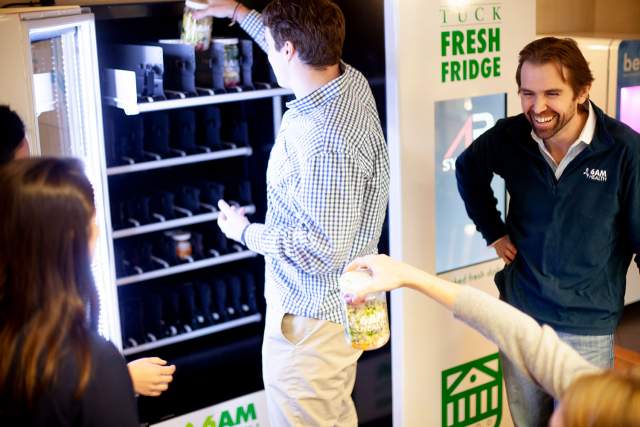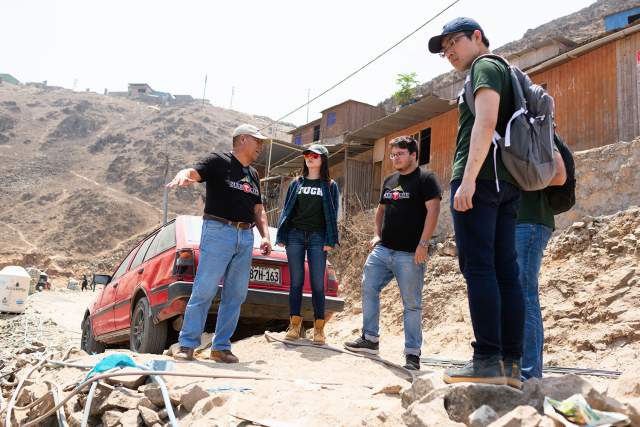Developing a Roadmap for Lime’s Future in Italy
For their First-Year Project, five Tuck students traveled to Rome to develop a partnership strategy for a burgeoning urban mobility company.
by Betsy Vereckey
May 21, 2019
As a lifelong commuter in major hubs like New York City, Boston, and Chicago, David Fayngor T’20 knows all about the pain points of a daily commute.
When he noticed an explosion of e-scooters in his hometown of Los Angeles, Fayngor started thinking about how urban mobility was changing. He decided he wanted to learn more about this field and help shape it.
“I wanted to better understand urban mobility, explore how technology can enhance transportation and improve my project management skills,” Fayngor says. “And the Global First-Year Project [FYPGO] was the perfect opportunity to tie all my goals together.” The FYPGO is a course for first-year students that gives them the chance to apply classroom learning to complex business challenges faced by real, international clients.
An entrepreneur at heart, Fayngor decided to develop his own FYPGO that would explore the unique dynamics of the e-mobility industry. He connected with Lime, a global electric scooter company based in San Francisco, and proposed a project to complement their European expansion.
“It was a value-add on both sides,” Fayngor says. “My client, Marco Pau [general manager of Lime Italy], collaborated with us to create a project that included both strategic and tactical elements. His FYPGO team would help Lime Italy build an effective framework to determine the efficacy of their marketing strategies.”
Fayngor, who has a background in digital marketing, assembled a diverse team of T’20s. Priyal Morzaria comes from an investment banking background, while Jessica Likovich has experience with financial product sales and analytics. Dunsin Alabi specializes in equity research and technology consulting, respectively. The team brought on marketing professor and global experiential learning expert Peter Golder as their advisor. Golder is also the faculty director of TuckGO.
Lime presented a challenge to the Tuck team: The urban mobility company needed to develop a measurement framework that would help define and assess the impact of its partnerships.
Over spring break, the students and Professor Golder traveled to Italy to meet with the Lime team. As soon as they landed, Fayngor gained a new understanding of the challenges Lime was facing.
“It was an eye-opening experience,” recalls Fayngor. “Despite Lime’s global footprint, the company truly operates as a startup. Lime leverages technology to keep operations incredibly lean. The organization approaches marketing in a similarly lean way.”
Over spring break, the students and Professor Golder traveled to Italy to meet with the Lime team. As soon as they landed, Fayngor gained a new understanding of the challenges Lime was facing.
Since the Lime operations team has so many responsibilities to juggle, it was vital that the framework the Tuck team created was efficient, effective, and adaptable. They also had to take Italian cultural differences into account.
“Milan is incredibly open to innovative, environmentally safe technologies, while Rome is more cautious about preserving its rich history and classic atmosphere,” Fayngor says.
Using Rome as a home base, the Tuck team traveled to Rimini, a city on the Adriatic coast, to learn more about Lime’s partnership with Treno Verde, which translates literally to “green train.” The Treno Verde train stops at different cities in Italy to promote green technology and environmentally-conscious behavior. The Tuck team also met Lime’s public relations group, Consensoeu, to learn more about the ways in which businesses create cohesive narratives.
Having learned more about the specific challenges Lime Italy faces, the Tuck team returned to Hanover with a better understanding of the required next steps to execute on the project. In order build a better framework, they used qualitative skills developed in their course Consumer Insights and issued a survey to potential Lime riders.
The team also leveraged the wide-ranging Tuck network and its exceptional resources to help make this project a success.
Since I created it, I was responsible for setting goals, executing on them, and monitoring every step of the project. This experience taught me a great deal about the full cycle of a project.
“Becky Rice from the FYPGO office helped us with all the logistics and really supported the project,” says Fayngor. “Overall Tuck provided amazing support for our FYPGO project.” For example, Meghna Kedia, a T’18 who works at Lime in Canada, took the time to help the students conduct a gut check for their framework.
Looking back on it, Fayngor credited his FYPGO experience for teaching him how to lead when the path isn’t entirely clear.
“Although I have some management experience, this project was demanding because it was so ambiguous,” he says. “Since I created it, I was responsible for setting goals, executing on them, and monitoring every step of the project. This experience taught me a great deal about the full cycle of a project.”

